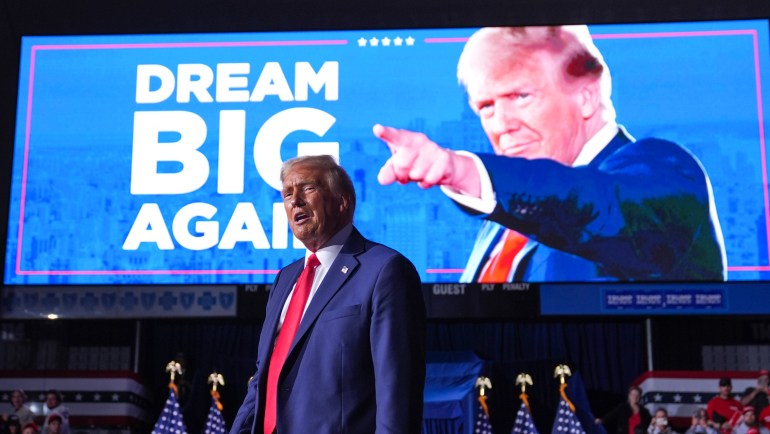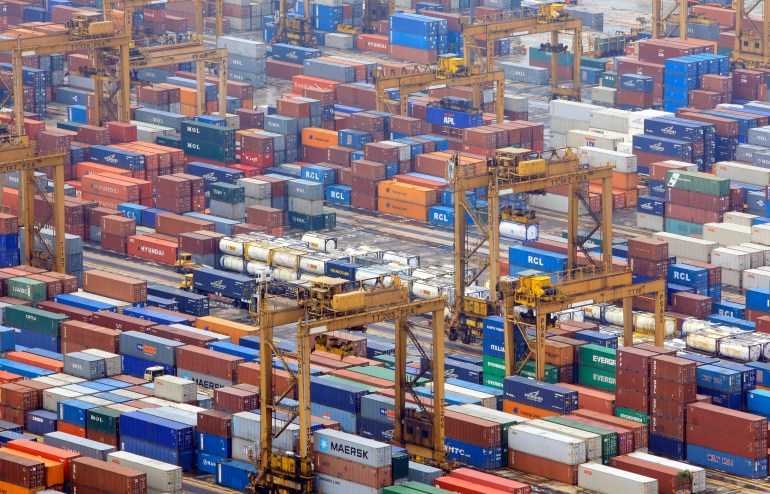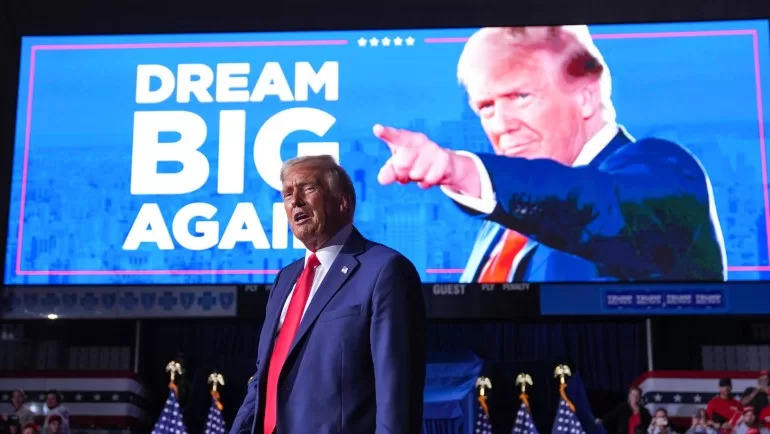Taipei, Taiwan – Asia is bracing for disruption should American voters return Donald Trump to the White House, with his plans for sweeping tariffs threatening to hobble the region’s export-driven growth.
Trump, who ran neck-and-neck with Vice President Kamala Harris in polls before Tuesday’s presidential election in the United States, has pledged to impose tariffs of 60 percent or more on Chinese imports and tariffs of 10 to 20 percent on all other foreign goods.
The trade measures would come on top of tariffs on $380bn worth of Chinese goods that Trump imposed during his first term and current President Joe Biden kept in place.
Trump’s duties could result in a particularly serious economic fallout in Asia, home to many of the world’s most trade-dependent economies.
The 10 members of the Association of Southeast Asian Nations have an average trade-to-gross domestic product (GDP) ratio of 90 percent, double the global average, according to the Hinrich Foundation, a trade-focused philanthropic organisation based in Singapore.
Emerging East Asia’s trade-to-GDP ratio is higher still, at 105 percent, according to the Brookings Institution, a Washington, DC-based think tank.
“We can expect that there will be some type of move to turn US policy more protectionist, and that’s bad for Asia because most of the region’s economies, if not all the economies, are incredibly reliant on external demand – specifically demand coming from the US,” Nick Marro, principal economist for Asia at the Economist Intelligence Unit, told Al Jazeera.

While parts of Asia benefited from the initial US-China trade war as companies shifted production away from China, the broad-based tariffs Trump has proposed this time around would inflict economic damage across the region, analysts said.
Oxford Economics has said that “non-China Asia” would be a net loser with the region’s exports and imports predicted to fall 8 percent and 3 percent, respectively.
Last week, Trump’s plans prompted a rare warning from the head of Singapore’s sovereign wealth fund, Rohit Sipahimalani, who said the tariffs could “create uncertainty” and “impact global growth”.
“He’ll do what he said he’s going to do. He’ll impose tariffs, and he’ll impose them quickly,” Steve Okun, the founder and CEO of Singapore-based APAC Advisors, told Al Jazeera.
“This is not going to be like the first term, where it’s going to be a year or two before he does anything.”
With Chinese companies likely to divert more production to Southeast Asia to circumvent higher tariffs, Trump could also ramp up measures targeting exports from countries such as Vietnam, Malaysia and Thailand, Marro said.
“These all point to a pretty worrisome outlook when it comes to the wider region,” he said.
Asia could also potentially move to impose tariffs of its own to combat dumping by Chinese companies seeking markets to replace the US.
Such concerns in January prompted Malaysia to impose a 10 percent tariff on certain low-value goods while Indonesia last month banned ultra-cheap Chinese e-commerce site Temu in a bid to protect domestic companies.
In a number of cases, Trump has singled out particular economies over what he alleges are their unfair trade practices. Trump has, for example, repeatedly accused Taiwan of “stealing” the global chip industry from the US.
Like China and Vietnam, Taiwan has a large trade surplus with the US, which is a source of aggravation for Trump, said Deborah Elms, head of trade policy at the Hinrich Foundation.
“Not only is Trump obsessed with goods, but the metric that he uses for assessing whether the United States is winning or losing is a trade deficit in goods,” Elms told Al Jazeera. “If you are on the wrong side of that metric, … you’re going to be in trouble.”
Despite many of these concerns, Trump may be no worse for the region than Harris if Biden’s protectionist policies are any guide to how his vice president might govern, said Jayant Menon, a senior fellow at Singapore’s ISEAS-Yusof Ishak Institute.
While Biden is seen as less unpredictable than Trump, he not only kept his predecessor’s tariffs on Chinese goods but also imposed new tariffs affecting $18bn worth of imports including steel, semiconductors and electric vehicles.
Biden has also implemented protectionist policies through legislation such as the CHIPS Act, which aims to boost semiconductor production in the US and keep advanced chips out of Chinese hands.
Harris is widely expected to continue or expand Biden’s policies towards trade and industry although she has gone into little detail during the presidential campaign.
“At the moment, it looks like from a purely protectionist stance Harris will be more protectionist, but there’s not that element of uncertainty and anti-globalisation that comes with Trump that can get out of control,” Menon told Al Jazeera.

Julien Chaisse, an expert in international economic law at the City University of Hong Kong, said that while Harris may be more of a team player than Trump on economic issues, she is likely to follow many of the same protectionist principles.
“Harris may also pursue deeper cooperation with Asian allies on AI and cybersecurity to protect supply chains and counter Chinese influence in tech. Though less confrontational than Trump, Harris’s policy would likely maintain some scrutiny on Chinese investments in critical infrastructure across Asia,” Chaisse told Al Jazeera.
Other observers in the region, such as Liew Chin Tong, Malaysia’s deputy minister of investment, trade and industry, have voiced similar sentiments.
In an interview with The Straits Times this week, Liew said the difference between Trump and Harris was a matter of “intensity” rather than “direction”.
“Trump will definitely take a far more isolationist and America First approach, but it doesn’t mean Harris will be able to take the world back to 1995 when the WTO [World Trade Organization] was formed,” Liew told the newspaper.
Another difference between Trump and Harris could be simple timing.
While Trump would be likely to take advantage of his executive power to quickly impose tariffs, Harris could be preoccupied with policy issues at home, Elms said.
“The first challenge is that she’s not personally invested in [trade]. But the second challenge, which I think we can’t overstate, is the difficulty that her administration is going to have for a long period of time as she comes into office managing domestic relations,” Elms said.
“I suspect that will take all her time and energy for at least a year. That means on trade, which was never a priority for her, they’re going to be in a bit of a holding pattern as they focus on domestic issues for at least a year.”
